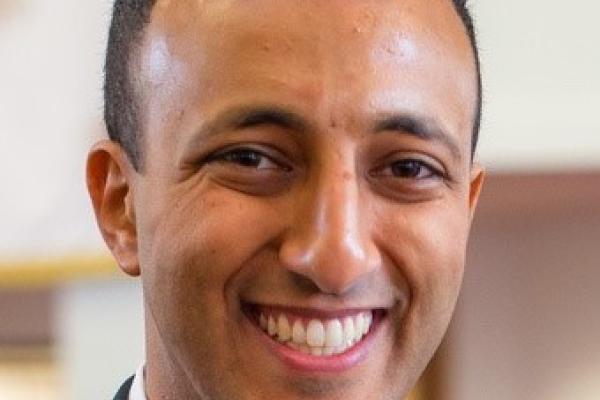Chemist’s New NIH MIRA Grant a Game-Changer for Drug Discovery

David Nagib, assistant professor, chemistry and biochemistry, just received a significant award that encourages promising new and early stage investigators to tackle ambitious, far-reaching projects that impact health. Nagib’s five-year, $1,749,619 “Maximizing Investigators' Research Award (MIRA) Outstanding Investigator Award from the National Institutes of Health (NIH) funds work on synthesizing medicinal candidates via a new strategy called Chaperones for Radical Relays: Enabling Directed C-H Functionalizations.
Nagib shares the significance of his research, the impact the new grant will have and the importance of collaboration.
How important is this grant to your work?
This NIH award is a game-changer for our laboratory for two main reasons:
- It provides stable, long-term research funding, so we can devote all of our time to research (rather than grant-writing), and;
- It allows us significant freedom and flexibility to pursue especially "high-risk/high-reward” ideas.
Can you explain how the NIH MIRA funding will allow you to do #2?
“Our research team is focused on harnessing free radical chemistry to manipulate the molecular structure of medicines – to improve their pharmacological activity. The BIG challenge is that we are going after C-H bonds, which are the most ubiquitous functionality in all medicines.
To do this, we must invent new strategies that are both unusually reactive and precise in order to selectively mutate a single C-H amidst a sea of similar C-Hs found in complex, organic molecules. We believe that free radicals hold the key to solving this problem.
“This award will allow us to continue pursuing important challenges in the modern field of C-H functionalization with ideas that are innovative and perhaps more high-risk/high-reward.
What is your ultimate goal?
Our dream is to build an entire synthetic toolbox of “radical relay chaperones” that will allow a chemist anywhere in the world to take a cancer drug, antibiotic or diabetes pill off a shelf and make more potent, targeted analogs from it ... in a single afternoon. This could lead to a fundamentally new approach to designing and synthesizing improved medicines.
Your website shows a dynamic, energetic group of aspiring young scientists. Can you share how they contribute to the research?
Science is very much a team sport. Great discoveries require a strong, unified team working together to solve a big challenge from every angle. Luckily, I have the best labmates ever!
My colleagues include talented and passionate undergraduate and graduate students, as well as postdoctoral fellows. When you have a dozen people constantly helping you to design more clever experiments and then meticulously sifting through all the data, it’s much easier to do great science and make important discoveries.
